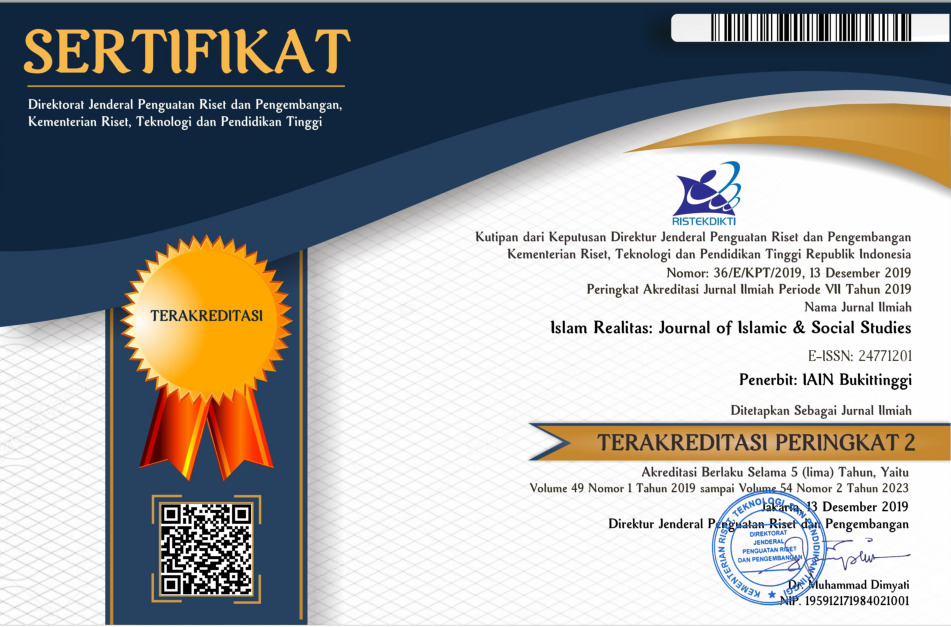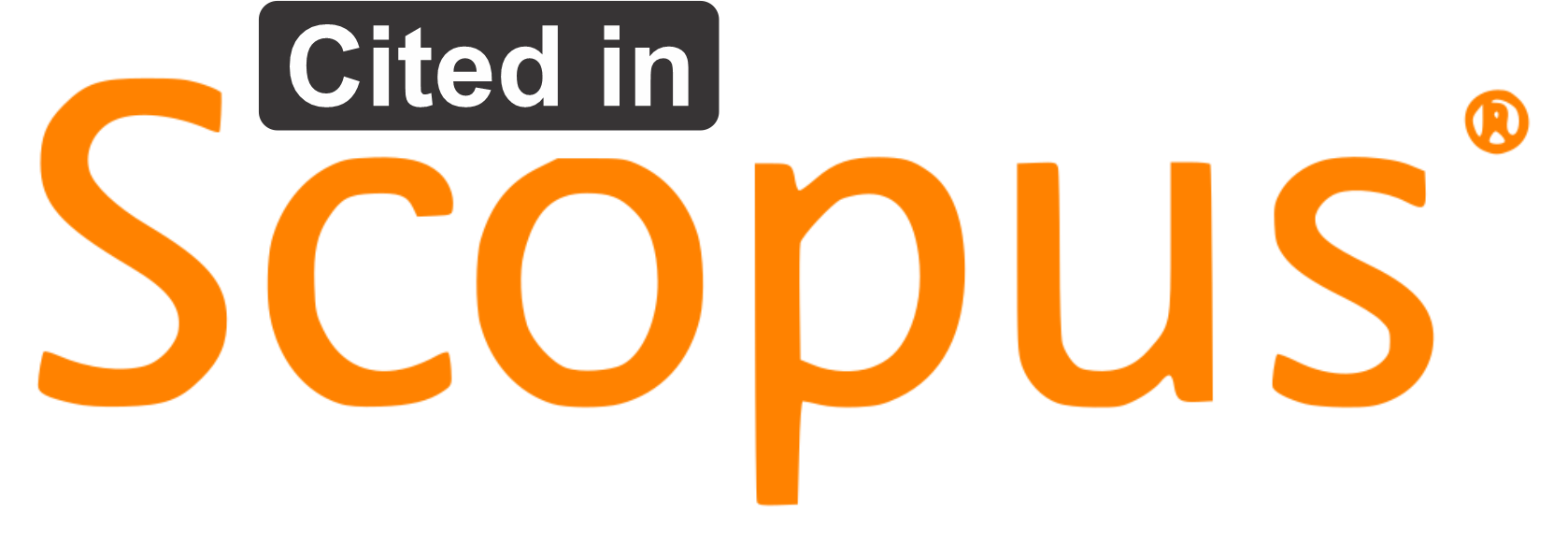Buya, Spiritual Charisma and Political Contention in West Sumatra
Downloads
The article unravels the roles of buyas (charismatic scholar of the community) in coping with confidence issues amongst politicians who competed in the Limapuluh Kota Regency’ 2015 Regional Election in West Sumatra. The study aims to answer the following questions: first, what are the politicians’ motives to seek audience from the buya? Second, what are rituals and statements that the buya provide? As part of a qualitative research conducted within the Regency, the data were collected through in-depth interviews to four buyas and four candidates. The interview results were then analyzed through qualitative approaches. The result of the study indicates that politicians and their canvassers performed ‘political safari’ by visiting buyas upon becoming candidate hopefuls or being pronounced candidates by the Election Committee. It is worth noting that although buyas never rejected any politician or canvasser who wished to meet them, they were never involved in direct campaigns with the candidates or canvassers. In essence, buyas provide politicians a sense of legitimacy at a time when they are losing confidence in themselves. Eventually, as in all political competitions, there will always be victors and losers.
Books
Azra, Azyumardi. Surau: Pendidikan Islam Tradisional dalam Transisi dan Modernisasi (Surau: Tradition Islamic Education in Transition and Modernization). Jakarta: PT. Logos Wacana Ilmu, 2003.
Dhofier, Zamakhasyari. Tradisi Pesantren: Studi Pandangan Hidup Kyai dan Visinya Mengenai Masa Depan Indonesia (Pesantren Tradition: A Study on the Outlook of Kyai and Their Vision on the Future of Indonesia). Jakarta: LP3ES, 2011.
Hamka. Islam dan Adat Minangkabau (Islam and the Minangkabau Customs). Jakarta: Pustaka Panjimas, 1984.
Haqiri, Muhammad Syatibi Al-Arraiyyah, M. Hamdar, Moh.bunyamin Yusuf S, Munawiroh, Enang Sudrajat, H.M. Shohib Tahar, Mazmur Sya’roni, Aden Dainuri, et al. Ulama Dalam Penyebaran Pendidikan Dan Khazanah Keagamaan (Ulama in the Dissemination of Education and Religious Riches). Jakarta: Puslitbang lektur keagamaan, 2003.
Hasan, Noorhaidi, Suhadi, Najib Kailani, Munirul Ikhwan, Ahmad Rafiq, Euis Nurlaelawati, Eva Latipah, et al. Ulama, Politik, dan Narasi Kebangsaan: Fragmentasi Otoritas Keagamaan Di Kota-Kota Indonesia (Ulama, Politics, and National Narratives: Fragmentation of Religious Authorities in Indonesian Cities). Edited by Munirul Ikhwan Ibnu Burdah, Najib Kailani. I. Yogyakarta: Pusat Pengkajian Islam Demokrasi dan Perdamain (PusPIDeP), 2019.
Kuntowijoyo. Perubahan Sosial Dalam Masyarakat Agraris (Social Changes in Agrarian Society). Yogyakarta: Matabangsa, 2002.
Muhibbin. Politik Kiai vs Politik Rakyat: Pembacaan Masyarakat Terhadap Perilaku Politik Kiai (Politics of Kiai v. Politics of the People: Community's View on the Political Behaviours of Kiai). Yogyakarta: Pustaka Pelajar, 2012.
Muhtarom. Reproduksi Ulama di Era Globalisasi (Regeneration of Ulama in the Globalization Era). Yogyakarta: Pustaka Pelajar, 2005.
Muliawan, Jasa Ungguh. Ilmu Pendidikan Islam: Studi Kasus Terhadap Struktur Ilmu, Kurikulum, Metodologi Dan Kelembagaan Pendidikan Islam (Islamic Paedagogy: Case Study on the Structures of the Science, Curriculum, Methodology, and Institution of Islamic Education). Jakarta: PT. Rajagrafindo Persada, 2015.
Muthmainnah. Jemabatan Suramadu Respon Ulama Terhadap Industrialisasi (Suramadu Bridge the Response of Ulama towards Industrialization). Yogyakarta: LKPSM, 1998.
Patoni, Ahmad. Peran Kiai Pesantren Dalam Partai Politik (The Roles of the Kiai of Pesantren in Political Parties). Yogyakarta: Pustaka Belajar, 2007.
Ritzer, George, and Donglas J. Goodman. Teori Sosiologi Modern (Modern Theories of Sociology). Jakarta: Prenada Media, 2005.
Rusli, Risan. Tasawuf Dan Tarekat Studi Pemikiran Dan Pengalaman Sufi (Tasawuf and Tarekat: A Study on the Thoughts and Experiences of Sufi) . Jakarta: Rajawali Pers, 2013.
Sukby, Badaruddin. Dilema Ulama Dalam Perubahan Zaman (The Dilemma of Ulama in Change of Era). Jakarta: Gema Insani Press, 1995.
Syam, Nur. Bukan Dunia Berbeda: Sosiologi Komunitas Islam (Not a Different World: The Sociology of Islamic Communities). Surabaya: Pustaka Eureka, 2005.
Weber, Max. The Theory of Social and Economic Organization. New York: The Falcon’s Wings Press, 1947.
Journals
Abu Bakar, MS, and Imam Hanafi. “Berebut Paling Shaleh: Penguatan Identitas Ulama Di Era Milenial (Racing for the Most Pious).†Jurnal Penelitian Sosial dan Keagamaan 34, no. 2 (2017): pp. 72–98. http://e-journal.lp2m.uinjambi.ac.id/ojp/index.php/Kontekstualita/article/view/39.
Adi, Mohammad. “Fenomenologi Konstruksi Sosial Pada Kiai Yang Berpolitik Praktis (Phenomenology of Social Construction on Kiai who Practice Politics.†Ulûmuna: Jurnal Studi Keislaman 7, no. 1 (2021): p. 200.
Asiyah, Siti, and Arif Chasanudin. “Pondok Pesantren Dan Dakwah Politik: Kajian Histori Pondok Pesantren Hasyim Asy’ari Bangsri Jepara (Pondok Pesantren and Political Dakwa: Historical Study on Pondok Pesantren Hasyim Asy'ari of Bangsri in Jepara).†Jurnal Ilmu Dakwah 40, no. 1 (2020): pp. 27–39.
Aziz, Rizky Amalia. “Kiai Dan Politik Elektoral: Peran Kiai Yusuf Chudlori Dalam Pemenangan Kandidat Jokowi-Ma’ruf Amin Pada Pilpres 2019 Di Kecamatan Tegalrejo (Kiai and Electoral Politics: the Roles of Kiai Yusuf Chudlori in Winning the Jokowi-Ma'ruf Amin in the 2019 Election).†Jurnal PolGov 2, no. 2 (2020): pp. 223–276.
Bahaudin. “Mistik dan Politik: Praktek Perdukunan Dalam Politik Indonesia (Mysticism and Politics: Practice of Shamanism ini Indonesian Politics).†Jurnal Keamanan Nasional 1, no. 3 (2015): pp. 365–386.
Baihaqi, Mohamad. “Legitimasi Majelis Ulama Indonesia (MUI) Dalam Kontestasi Islam Politik Mutakhir (The Legitimacy of Indonesian Council of Ulama in the Recent Islamic Political Contention).†Al Ma’ Arief: Jurnal Pendidikan Sosial Dan Budaya 1, no. 2 (2019): pp. 102–117.
Efendi, Rohmad. “Self Efficacy: Studi Indigenous Pada Guru Bersuku Jawa (Self Efficacy: Indigenous Study on Javanese Ethnicity Teachers).†Journal of Social and Industrial Psychology Vol. 2, no. No. 2 (2013): pp. 61–67. https://journal.unnes.ac.id/sju/index.php/sip/article/view/2595.
Fahmi, K. “Prinsip Kedaulatan Rakyat Dalam Penentuan Sistem Pemilihan Umum Anggota Legislatif (The Principles of People's Sovereignty in the Legislative Election).†Jurnal Konstitusi 7, no. 3 (2010): pp. 119–160.
Fajar, Ahmad. “Politisasi Isu Agama Di Media Massa: Strategi Politik Hos Cokroaminoto Dalam Surat Kabar Djawi Hisworo (1918) (Politicization of Religious Issues in Media: Political Strategy of HOS Cokroaminoto in the Djawi Hisworo Newspaper of 1918).†Journal of Islamic History 1, no. 1 (2021): pp. 78–100.
Faridl, Miftah. “Peran Sosial Politik Kyai Di Indonesia (Social Political Roles of Kyai in Indonesia).†Jurnal Sosioteknologi 11 Year 6 (2007): pp. 238–243.
Hadi, Anuri Furqon. “Ulama Dalam Pandangan Masyarakat Jakarta: Sebuah Pemaknaan Berdasarkan Ruang (Ulama in the View of Jakartans: a Spatial-based Semantic Process).†KARSA: Journal of Social and Islamic Culture 20, no. 1 (2012): pp.108–126. http://www.ejournal.stainpamekasan.ac.id/index.php/karsa/article/view/56.
Halim, Abdillah. “Fatwa dan Politisasi Agama (Analisis Wacana Penggunaan Fatwa Pada Pilkada DKI Jakarta) (Fatwa and Politicization of Religion (An Analysis to the Discourse of Fatwa Usage in the Regional Election in DKI Jakarta)).†An-Nuha: Jurnal Kajian Islam, Pendidikan, Budaya & Sosial 5, no. 2 (2018): pp. 231–259. http://ejournal.staimadiun.ac.id/index.php/annuha/article/view/272/108.
Hartono, Toni. “The Surau Suluk and Tradition of Ratik Togak: The Expression of Piety Among the Followers of the Tarekat Naqsabandiyah in Rokan Hulu, Riau.†Sosiohumaniora 22, no. 2 (2020): pp. 233–241.
Hasanuddin, Muhammad Irfan. “Female Ulama: Mediating Religious Authority in a Limited ‘Islamic’ Public Sphere in Contemporary Indonesia.†Islam Realitas: Journal of Islamic & Social Studies 4, no. 2 (2018): 189.
Hasibuan, Zainal Efendi. “The Portrait of Surau as a Forerunner of Madrasah: The Dynamics of Islamic Institutions in Minangkabau Toward Modernization.†Ajis 1, no. 1 (2016): 1–28. http://journal.staincurup.ac.id/index.php/AJIS/article/view/90/39.
Huda, Miftahul, and M. Dayat. “Politisasi Ulama Pada Pilpres 2019 Perspektif Kiai Silo Di Kabupaten Pasuruan (Politicization of Ulama in the 2019 Presidential Election, the Perspective of Kiai Silo in Pasuruan Regency).†Kabilah: Journal of Social Community 4, no. 1 (2019): pp. 48–56.
Iswandi, Iswandi, and Gibran Abdullah. “Religious Issues in the 2019 Indonesia-Presidential Election.†Al-Dutsur 3, no. 1 (2020): pp. 1–21.
Jati, Wasisto Raharjo. “Agama Dan Politik: Teologi Pembebasan Sebagai Arena Profetisasi Agama (Religion and Politics: Liberation Theology as an Arena for Prophetization of Religion).†Walisongo: Jurnal Penelitian Sosial Keagamaan 22, no. 1 (2014): p. 133.
———. “Ulama Dan Pesantren Dalam Dinamika Politik Dan Kultur Nahdlatul Ulama.†Ulul Albab: Jurnal Studi Islam 13, no. 1 (2013): pp. 95–111.
Kadir, Abdul. “Apresiasi Keimanan Kepada Tuhan Melalui Pengalaman Spiritual.†Teosofi: Jurnal Tasawuf dan Pemikiran Islam 5, no. 1 (2015): pp. 1–15. http://dx.doi.org/10.1016/j.bpj.2015.06.056%0Ahttps://academic.oup.com/bioinformatics/article-abstract/34/13/2201/4852827%0Ainternal-pdf://semisupervised-3254828305/semisupervised.ppt%0Ahttp://dx.doi.org/10.1016/j.str.2013.02.005%0Ahttp://dx.doi.org/10.10.
Kosim, Muhammad. “Tradisi Madrasah Tarbiyah Islamiyah Di Sumatera Barat (The Tradition of Madrasah Tarbiyah Islamiyah in West Sumatra).†At-Tarbiyah 4, no. 1 (2013): pp. 21–45.
Kurniawan, Budi. “Politisasi Agama Di Tahun Politik: Politik Pasca-Kebenaran Di Indonesia Dan Ancaman Bagi Demokrasi (Politicization of Religion in the Political Year: Post-Truth Politics in Indonesia and the Threats to Democracy).†Jurnal Sosiologi Agama 12, no. 1 (2018): pp. 133–154.
Mahfud, Choirul. “Imagined Islamic Societies And The Role Of Ulema In Contemporary Indonesia.†AKADEMIKA: Jurnal Pemikiran Islam 24, no. 2 (2019). http://dx.doi.org/10.32332/akademika.v24i2.1567.
Mighfar, Shokhibul. “Ambiguitas Politik Ulama-Kiai (Political Ambiguity of Ulama-Kiai).†LISAN AL-HAL: Jurnal Pengembangan Pemikiran dan Kebudayaan 13, no. 1 (2019): pp. 37–50.
Muzakki, Akh. “Islamisme Dan Politisasi Agama Model PKS Dalam Pilpres 2009 (PKS-model of Islamism and Religious Politicization in the 2009 Presidential Election).†Islamica: Jurnal Studi Keislaman 5, no. 1 (2014): p. 61.
Oney, Emrah, and Gizem Oksuzoglu-Guven. “Confidence: A Critical Review of the Literature and an Alternative Perspective for General and Specific Self-Confidence.†Psychological Reports 116, no. 1 (2015): pp. 149–163.
Putra, D.I. Ansusa. “New Concept Of Ignorance: An Islamic Epistemological Approach To The Story Of Moses As Relevant Reference For Contemporary Ulama.†Islam Realitas: Journal of Islamic & Social Studies 5, no. 2 (2019): pp. 114–129.
Robbi Hidayat, Nurma Yuwita, and Gatut Setiadi. “Komunikasi Transedental Jamaah Gerak Batin Di Desa Glagahsari Dengan Pendekatan Symbolic Interaction Theory (Transcendental Communication of Jamaah Gerak Batin in Glagahsari Village by means of Symbolic Interaction Theory).†Al-Ittishol: Jurnal Komunikasi dan Penyiaran Islam 2, no. 1 (2021): pp. 34–46.
Ronaldo, Riki, and Darmaiza Darmaiza. “Politisasi Agama Dan Politik Kebencian Pada Pemilu Presiden Indonesia 2019 (Politicization of Religion and Hate Politics in Indonesian Presidential Election of 2019).†Indonesian Journal of Religion and Society 3, no. 1 (2021): pp. 33–48.
Safradji. “Ulama Dan Politik Di Indonesia Pasca Reformasi (Ulama and Politics in Indonesia in Post-Reform).†Al-Iman: Jurnal Keislaman dan Kemasyarakatan 4, no. 1 (2020): pp. 248–267.
Salahuddin. “Menembus Batas Lahiriah Persperktif AL-Ghazali: Refleksi Bagi Dunia Pendidikan (Breaking through the Material Limits of the Perspectives of al-Ghazali).†Lentera Pendidikan 18, no. 2 (2015): pp. 171–182.
Setiawan, Eko. “Keterlibatan Kiai Dalam Politik Praktis Dan Implikasinya Terhadap Masyarakat (The Involvment of Kiai in Practical Politics and its Implication to the Society).†Ar-Risalah 13, no. 1 (2014): p. 15.
Siregar, Miftahul Husna, Muhammad Arif Nasution, and Warjio Warjio. “Politisasi Agama Pada Kampanye Pemenangan Eramas Dalam Pilkada Sumatera Utara Tahun 2018 (Politicization of Religion in the Canvassing of Eramas in the 2018 Regional Election of North Sumatra).†Perspektif 11, no. 1 (2021): pp. 1–7.
Sulfa, Nafilah. “Ulama Dalam Penguatan Politik Identitas Perspektif Al-Qur’an (Ulama in the Strengthening of Identity Politics: the Perspective of the Qur'an).†Revelatia: Jurnal Ilmu al-Qur`an dan Tafsir 1, no. 2 (2020): pp. 179–200.
Suradi, Ahmad Adi, and Buyung Surahman. “Kiai’s Role As Ulama and Umara: Implications to the Pesantren Education.†Masyarakat, Kebudayaan dan Politik 33, no. 2 (2020): p. 202.
Online Media
Agne, Yolanda. “Safari Politik, Cara Meningkatkan Citra Tokoh Maupun Partai.†Tempo.Co. Last modified 2022. https://nasional.tempo.co/read/1631172/safari-politik-cara-meningkatkan-citra-tokoh-maupun-partai.
Asrori, Musthofa. Tuan Guru, Sebutan Ulama Khas Lombok, 2015. https://www.nu.or.id/nasional/tuan-guru-sebutan-ulama-khas-lombok-6Vd0k.
Azmi, Muhyidin. Haji Dan Seputar Gelar Tuan Guru, 2021. https://alif.id/read/maz/haji-dan-seputar-gelar-tuan-guru-b240936p/.
CNN Indonesia. Muasal Mistik “Bertahan†Di Tengah Masyarakat Indonesia, 2019. https://www.cnnindonesia.com/hiburan/20191027174605-241-443282/muasal-mistik-bertahan-di-tengah-masyarakat-indonesia.
Https://video.tempo.co. Ini Daftar 40 Lembaga Survei Yang Diakui KPU, 2019. https://video.tempo.co/read/14316/ini-daftar-40-lembaga-survei-yang-diakui-kpu.
kumparanNEWS. Prabowo Kunjungi Pesantren Di Sukabumi: Mohon Doa Kepada Kiai, 2018. https://kumparan.com/kumparannews/prabowo-kunjungi-pesantren-di-sukabumi-mohon-doa-kepada-kiai-1538918125366315993/full.
Muarabagja, Mohammad Hatta. “Tujuan Safari Politik, Apakah Hanya Mengerek Elektabilitas?†Tempo.Co. Last modified 2022. https://nasional.tempo.co/read/1631955/tujuan-safari-politik-apakah-hanya-mengerek-elektabilitas.
Interviews
Interviews with Buya and Politicians in Limapuluh Kota Regency in 2019 (1-30 July 2019). Names are hidden.
Authors who publish with this journal agree to the following terms:
- Authors retain copyright and grant the journal right of first publication with the work simultaneously licensed under a Creative Commons Attribution License that allows others to share the work with an acknowledgment of the work's authorship and initial publication in this journal.
- Authors are able to enter into separate, additional contractual arrangements for the non-exclusive distribution of the journal's published version of the work (e.g., post it to an institutional repository or publish it in a book), with an acknowledgment of its initial publication in this journal.
- Authors are permitted and encouraged to post their work online (e.g., in institutional repositories or on their website) prior to and during the submission process, as it can lead to productive exchanges, as well as earlier and greater citation of published work (See The Effect of Open Access).









